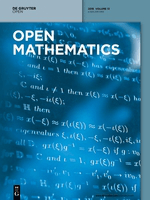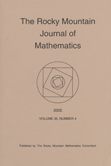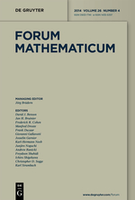
Journal of Contemporary Mathematical Analysis-Armenian Academy of Sciences
Scope & Guideline
Elevating Mathematical Discourse for Real-World Impact
Introduction
Aims and Scopes
- Functional Analysis and Operator Theory:
The journal frequently publishes papers that explore properties of various function spaces, including weighted and mixed-norm spaces, and their applications in operator theory. - Complex Analysis and Meromorphic Functions:
There is a strong emphasis on the study of meromorphic functions, including their uniqueness properties, sharing values, and relationships with differential equations. - Approximation Theory and Fourier Analysis:
Research on approximation methods, including spline systems, Fourier series, and their convergence properties, is a significant focus of the journal. - Equations and Inequalities:
The journal covers a broad range of mathematical equations, including integral, differential, and functional equations, along with inequalities related to polynomials and functions. - Probability and Statistical Models:
Emerging themes include the application of mathematical analysis in probability theory and statistical estimation, particularly in relation to stationary models. - Geometric and Algebraic Analysis:
Papers often explore geometric properties of functions and spaces, including the study of convex bodies and algebraic curves, contributing to both theoretical and applied mathematics.
Trending and Emerging
- Advanced Functional Analysis:
There is an increasing focus on advanced concepts in functional analysis, particularly related to operator theory, which is evident in the growing number of publications discussing mixed-norm spaces and extrapolation methods. - Meromorphic Functions and Their Applications:
Research on meromorphic functions continues to expand, with a notable emphasis on their uniqueness properties and applications in solving complex equations, indicating a renewed interest in this area. - Dynamic Systems and Delay Equations:
Emerging research themes include the dynamics of systems with variable delays, reflecting a growing interest in understanding stability and behavior in mathematical models. - Stochastic Processes and Statistical Analysis:
There is a noticeable trend towards the application of mathematical analysis in stochastic processes, with an emphasis on statistical estimation techniques in contemporary models. - Fractional Calculus and Nonlocal Models:
The exploration of fractional calculus and its applications, particularly in nonlocal models and equations, is increasingly prominent, indicating a shift towards more modern analytical methods.
Declining or Waning
- Classical Inequalities:
Papers dedicated to classical inequalities, such as those related to polynomials and specific functional forms, have seen a decrease in recent years, suggesting a potential shift towards more contemporary applications. - Geometric Properties of Special Functions:
Research exploring geometric aspects of traditional special functions has become less frequent, indicating that newer methodologies or functions may be garnering more attention. - Nonlinear Differential Equations:
Although still relevant, the focus on nonlinear differential equations appears to be waning, possibly due to the emergence of more complex or novel equation types that are now being prioritized. - Statistical Methods in Classical Analysis:
The integration of statistical methods into classical mathematical analysis has seen a reduction, as the journal may be shifting towards more pure mathematical approaches.
Similar Journals

Eurasian Mathematical Journal
Advancing Mathematics, Bridging Cultures.Welcome to the Eurasian Mathematical Journal, a prominent platform dedicated to advancing the field of mathematics, particularly in its miscellaneous applications. Published by the esteemed L N Gumilyov Eurasian National University in Kazakhstan, this journal has been serving the academic community since 2014. With an ISSN of 2077-9879, it has successfully carved its niche within the mathematical landscape, presently ranked Q2 and placing in the 64th percentile among general mathematics publications in Scopus. The journal aims to foster scholarly exchange through high-quality research articles, reviews, and theoretical advancements that enhance understanding and application of mathematical concepts. By prioritizing open accessibility and a rigorous peer-review process, the Eurasian Mathematical Journal contributes significantly to both theoretical exploration and practical innovation, making it an essential resource for researchers, professionals, and students alike.

Ukrainian Mathematical Journal
Connecting Researchers Through Quality ScholarshipThe Ukrainian Mathematical Journal is a prominent academic publication in the field of mathematics, focusing on a diverse range of topics that appeal to researchers, professionals, and students alike. Published by Springer, this journal has been an important platform for disseminating significant mathematical research since its inception in 1957. With the aim of fostering knowledge and collaboration within the mathematical community, the journal curates high-quality articles that meet rigorous scholarly standards, evidenced by its Q3 ranking in the miscellaneous mathematics category for 2023. Although it currently does not offer open access, the journal remains accessible through various institutional subscriptions. It serves as a vital resource for ongoing discourse in the field and invites contributions that further advance mathematical understanding.

Open Mathematics
Fostering Collaboration Through Open Mathematical DiscourseOpen Mathematics, published by DE GRUYTER POLAND SP Z O O, is a prominent peer-reviewed journal that has been a vital platform for disseminating innovative research in the field of mathematics since its inception in 2015. With an impressive impact factor reflected by its Q2 ranking in the miscellaneous mathematics category and a commendable Scopus rank of #91 out of 399, it positions itself as a significant contributor to the mathematical community. This open access journal, headquartered in Poland, welcomes submissions that tackle diverse mathematical theories, applications, and methodologies, fostering knowledge exchange among researchers, professionals, and students globally. Since its launch, Open Mathematics has focused on bridging the gap between theoretical advancement and practical applications, making it an essential resource for anyone seeking to stay at the forefront of mathematical research and innovation. The journal offers easy online access, enhancing the visibility and impact of the valuable work published within its pages.

ROCKY MOUNTAIN JOURNAL OF MATHEMATICS
Pioneering Research for a Dynamic Mathematical CommunityROCKY MOUNTAIN JOURNAL OF MATHEMATICS, published by the Rocky Mountain Math Consortium, serves as a critical platform for researchers and practitioners in the field of mathematics since its inception in 1971. With a notable presence in the academic community, this journal covers a broad spectrum of mathematical disciplines, positioning itself in the Q2 category for Mathematics (miscellaneous) as of 2023. Despite being a subscription-based journal, it is recognized for its rigorous peer-review process and contributions to theoretical and applied mathematics, helping to advance knowledge and foster collaboration among mathematicians. The journal's ISSN number is 0035-7596 and its E-ISSN is 1945-3795, reflecting its commitment to accessibility and dissemination of high-quality research. Based in Tempe, Arizona, at Arizona State University, the journal continues to play an important role in shaping contemporary mathematical discourse through well-researched articles and innovative studies, aiming to bridge gaps between various mathematical subfields and engage a diverse audience, including students and established researchers alike.

ANNALI DI MATEMATICA PURA ED APPLICATA
Navigating the Landscape of Mathematical InnovationANNALI DI MATEMATICA PURA ED APPLICATA is a prestigious journal published by Springer Heidelberg, focusing on the field of Applied Mathematics. With a rich history dating back to its initial publication stages from 1858, this journal continues to serve as a vital platform for researchers and professionals seeking to disseminate high-quality, peer-reviewed research. The journal's strong reputation is reflected in its Q1 ranking in Applied Mathematics and its Scopus rank of #335 out of 635, placing it in the 47th percentile, showcasing its impact in the field. Although it is not an open-access journal, it provides exclusive insights and advancements in mathematical applications, allowing academics to explore innovative methodologies and theoretical developments. The combination of its long-standing tradition and contemporary relevance makes ANNALI DI MATEMATICA PURA ED APPLICATA an essential resource for scholars and students looking to deepen their understanding of mathematics and its practical applications.

Advanced Studies-Euro-Tbilisi Mathematical Journal
Exploring New Frontiers in MathematicsAdvanced Studies-Euro-Tbilisi Mathematical Journal, published by the esteemed TBILISI CENTRE MATH SCI, is a vital resource for scholars and practitioners in the field of mathematics. Since its inception in 2021, this journal has committed to advancing knowledge across various mathematical disciplines, including Algebra and Number Theory, Analysis, Applied Mathematics, and Geometry and Topology, although it currently holds a category quartile ranking of Q4 in all these areas. With an open-access format, it provides unparalleled access to cutting-edge research to a global audience of researchers, professionals, and students, fostering collaboration and innovation within the mathematical community. Operating from TBILISI, Georgia, the journal acknowledges the growing importance of diverse geographical contributions to mathematics and aims to spotlight emerging research trends. As research continues to evolve, Advanced Studies-Euro-Tbilisi Mathematical Journal seeks to enrich the academic dialogue and support the dissemination of mathematical knowledge.

FORUM MATHEMATICUM
Championing Rigorous Analysis and Methodologies in MathematicsFORUM MATHEMATICUM, published by WALTER DE GRUYTER GMBH, is a distinguished academic journal based in Germany, known for its significant contributions to the field of mathematics. With an ISSN of 0933-7741 and an E-ISSN of 1435-5337, the journal features comprehensive studies ranging from applied mathematics to diverse mathematical disciplines. Having maintained a commendable presence since 1989, FORUM MATHEMATICUM has achieved notable classification rankings, including Q2 in Applied Mathematics and Q1 in miscellaneous Mathematics as of 2023. Additionally, it holds a Scopus rank within the top 60th percentile in General Mathematics, making it a prominent platform for researchers and professionals seeking rigorous analysis and innovative methodologies in mathematics. While the journal does not currently offer open access, its rich content is pivotal for advancing mathematical theory and applications, appealing to students and seasoned academics alike.

Analysis Mathematica
Fostering excellence in mathematical exploration.Analysis Mathematica is a distinguished academic journal dedicated to the field of mathematics, focusing specifically on the varied aspects of analysis. Published by Springer International Publishing AG and based in Hungary, this journal has been an essential platform for scholarly communication since its inception in 1975. With a broad scope that encompasses theoretical developments and applications in mathematical analysis, it serves as a conduit for innovative research and discourse among mathematicians and researchers alike. While it currently holds a Q3 ranking in both Analysis and Miscellaneous Mathematics categories as of 2023, contributing authors are encouraged to elevate its impact through substantial contributions. Although not currently an open-access journal, Analysis Mathematica remains accessible through various academic databases, making it an invaluable resource for professionals, students, and researchers striving for excellence in mathematical analysis.

Rendiconti del Circolo Matematico di Palermo
Preserving a Legacy of Mathematical Innovation.Rendiconti del Circolo Matematico di Palermo, published by SPRINGER-VERLAG ITALIA SRL, is a revered journal in the field of mathematics, emphasizing the cultivation and dissemination of mathematical knowledge since its inception in 1887. With its ISSN 0009-725X and E-ISSN 1973-4409, this esteemed publication has continued to thrive, showcasing innovative research, comprehensive reviews, and thoughtful discussions from diverse areas in mathematics, particularly in its Q2 ranking within the miscellaneous mathematics category. Its historical significance is underscored by its convergence of publications across numerous years, including its notable periods from 1887 to 1916, 1919 to 1938, and beyond, effectively capturing the evolution of mathematical thought. Though not open access, the journal remains an essential resource for researchers, professionals, and students aiming to stay updated with the latest advancements and methodologies in the ever-evolving landscape of mathematics. With its Scopus rank placing it in the top 25th percentile, Rendiconti del Circolo Matematico di Palermo continues to be a cornerstone for scholarly dialogue and development in its domain.

ACTA SCIENTIARUM MATHEMATICARUM
Fostering Connections Between Theory and PracticeACTA SCIENTIARUM MATHEMATICARUM, published by SPRINGER BIRKHAUSER in Switzerland, is a distinguished journal focusing on the fields of mathematical analysis and applied mathematics. With an ISSN of 0001-6969 and an E-ISSN of 2064-8316, this journal serves as a critical platform for disseminating high-quality research that bridges theoretical and practical aspects of mathematics. Although currently categorized in the Q3 quartile for both Analysis and Applied Mathematics as of 2023, the journal strives to enhance its impact on the mathematical community by offering a perfect blend of rigorous research and innovative applications. Researchers, professionals, and students can benefit from the journal’s commitment to advancing knowledge in mathematics, despite the absence of open-access options. The mailing address for correspondences is 233 SPRING STREET, 6TH FLOOR, NEW YORK, NY 10013. As mathematics continues to evolve, ACTA SCIENTIARUM MATHEMATICARUM positions itself as a valuable resource for those looking to contribute to and stay informed about the latest developments in this vibrant field.